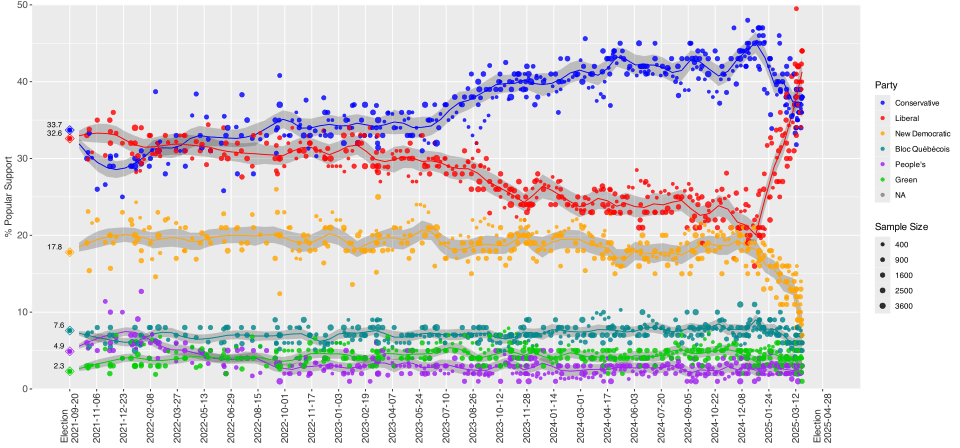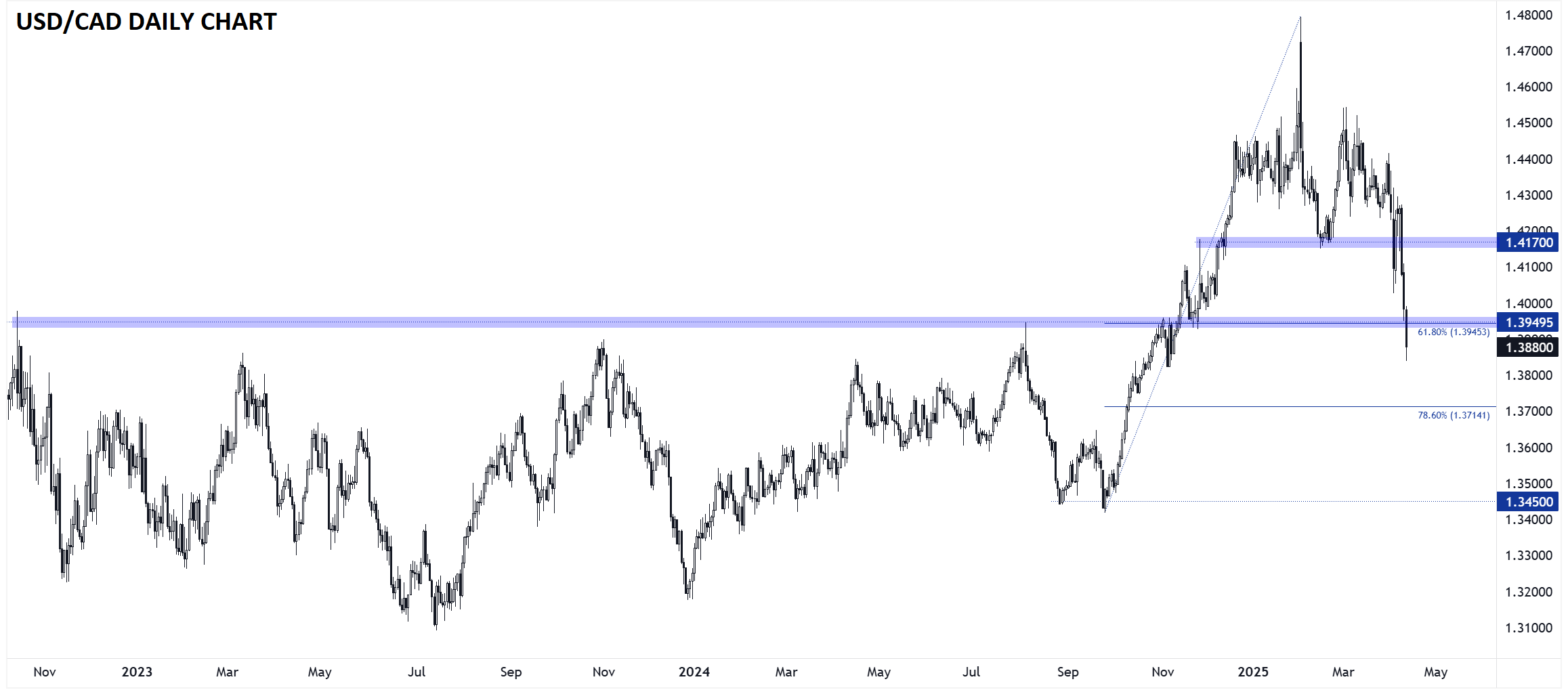- Escalating US trade tensions and shifting voter sentiments have given Mark Carney’s Liberals a boost against the Conservatives.
- Aggressive US tariffs and domestic economic concerns are the key electoral flashpoints.
- The election outcome could significantly impact Canadian stocks and the USD/CAD exchange rate.
Amidst escalating US trade tensions and big shifts in voter behavior, Canada’s snap election at the end of the month could bring major political changes…and significant market volatility.
As of writing, the Liberals, led by new Prime Minister Mark Carney, are ascendant, raising questions about the future direction of the Canadian economy and the future of its relationship with its neighbor to the South.
Canadian Federal Election 2025: Current Political Landscape
Following a turbulent few months marked by the fallout from aggressive U.S. tariff measures and political upheaval, Canada’s political stage has been dramatically reset.
Former Prime Minister Justin Trudeau announced that he would step down on January 6, allowing former Bank of Canada and Bank of England Governor Mark Carney to take over leadership of the Liberal party. Carney – largely on the back of his strong economic credentials – has reinvigorated the Liberal party ahead of the April 28 snap election, much to the chagrin of Conservative leader Pierre Poilievre, who was seen as a near shoe-in to win the election a few week ago. At a high level, Poilievre’s campaign has sought to rally traditional conservative support, emphasizing fiscal responsibility and national sovereignty.
At the same time, US President Trump’s tariff war and provocative rhetoric are arguably THE central issue for the election. Based on recent polling (more below), Carney’s promise to prioritize a new, balanced economic and security relationship with the United States is resonating with voters who view Canada’s economic sovereignty as vital in a time of global uncertainty.
Canadian Federal Election 2025: Latest Polling Data
Recent public opinion polls reveal a dramatic turnaround in electoral fortunes. As recently as late January, the Conservatives appeared to be in commanding shape; however, sweeping shifts (driven largely by opposition to U.S. trade policies) have seen the Liberal Party surge forward.
Current data indicates that the Liberals now poll around 44 percent, while the Conservatives have slipped to approximately 38 percent. Notably, a substantial portion of voters who recently switched their support to the Liberals cite the impact of President Trump’s tariff actions as a key reason behind their decision.

Source: Wikipedia
Canadian Federal Election 2025: Emerging Political Trends & Shifts
Several key trends are defining the current electoral landscape:
• U.S. Trade Tensions as a Catalyst:
President Trump’s tariff policies – most recently including a drastic 25 percent levy on imported vehicles and parts – have not only disrupted traditional voting patterns but have also shifted voter loyalties. With U.S.-Canada trade tensions dominating voter concerns, many Canadians are throwing their support behind parties seen as better equipped to stand up to President Trump’s aggressive economic tactics.
• Leadership Renewal with Mark Carney:
The election marks a decisive break from the past, with Carney emerging as the sole national leader boasting a clearly positive favorability rating. His fresh approach and reputation as a seasoned economic strategist have boosted morale amongst Liberals after Trudeau’s increasingly unpopular run as the head of the party.
• A Confluence of Domestic Priorities:
While older voters remain focused on the continuing trade war and its economic repercussions, younger Canadians are drawn to messages of reform and stability. This demographic, increasingly leaning toward a conservative platform on select issues globally, has nonetheless contributed to a broader electoral swing in favor of the Liberals in recent weeks.
Canadian Federal Election 2025: Will We Have a Clear Winner?
Unlike coalition-prone parliamentary systems, Canada’s first-past-the-post model often rewards a clear vote winner—but the possibility of a minority government remains. In this tight race, the Liberals’ recent gains could mean a robust mandate, yet even without an outright majority, they are positioned to command significant influence in Parliament.
The significant vote transfer from the N.D.P. and other parties to the Liberals indicates a potential consolidation of the left-leaning electorate. Even as the Conservatives retain pockets of strong support—particularly among young voters—the overall erosion of their broader base could lead to a scenario where a slim Liberal majority, or at least a stable minority, drives policy formation post-election.
Canadian Federal Election 2025: Potential Impact on USD/CAD
As one might expect, a Liberal win versus a Conservative victory could have a major impact on the USD/CAD exchange rate, primarily due to the impact on trade negotiations, market confidence, and economic policy signals.
Under Mark Carney’s leadership, a Liberal government is likely to prioritize balanced negotiations with the US. By seeking to de-escalate tariff disputes and stabilize cross-border trade, the policy outlook could boost investor confidence. A reduction in trade-related risks might strengthen the Canadian dollar relative to the US dollar.
Likewise, the Liberals’ emphasis on investing in domestic energy and infrastructure may signal long-term economic stability. If these investments successfully bolster key sectors, they could underpin a stronger CAD.
Conversely, a Conservative government, led by Pierre Poilievre, might adopt a more assertive stance on trade issues, potentially engaging in tit-for-tat tariff escalation with the US. If the approach leads to renewed trade friction or less predictable negotiations, market uncertainty could rise, potentially increasing pressure the Canadian dollar. While Conservatives tend to favor deregulation and fiscal austerity, which can be good for markets in the short term, any escalation in trade tensions or a perception of policy inflexibility might undermine investor confidence. Uncertainty in key export sectors (such as energy or manufacturing) could further weaken the Loonie relative to the greenback.
Canadian Dollar Technical Analysis – USD/CAD Daily Chart

Source: StoneX, TradingView
Looking at the chart, USD/CAD has been generally falling after tagging a 20+ year high in early February. As of writing, the pair is testing a key level of previous-resistance-turned-support and the 61.8% Fibonacci retracement of the September-February rally near 1.3950. If rates are above that key pivot, there is a case for a technical rally toward the February lows around 1.4170, but if the 1.3950 level gives way, there is little in the way of support until closer to 1.3700 (the 78.6% Fibonacci retracement) or 1.3450 (the September/October 2024 lows).
